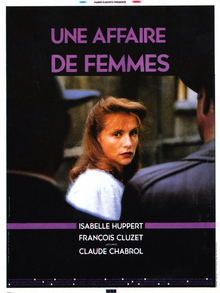Plot
Under the German military administration in occupied France during World War II, Paul Latour is a prisoner of war in Germany and his wife Marie lives hand-to-mouth with their two children in a squalid flat. A neighbour, whose husband is also in Germany, has fallen pregnant and is trying to lose the baby. Marie helps her successfully. Other women come to her and she starts charging.
While talking with Paul following his release, she reveals that a fortune teller saw "nothing but good things" in her future, along with a lot of women, which she would not clarify. Marie confesses to wanting to be a famous singer. She has, however, lost her love for her husband, who has been wounded and struggles to stay in employment, and rejects his crude and abrupt sexual demands.
Although he cannot find work, he rents a bigger flat at her prompting. Marie continues her illicit business and lets prostitutes use their bedrooms during the day. When one of the abortions goes wrong, the woman dies and her despairing husband commits suicide. Marie shrugs off the tragedy and hires a maid to help. She visits a music teacher, who tells her that she has a great voice.
She also starts a daytime affair with a collaborator and offers the maid a pay raise if she sleeps with Paul. Paul is unhappy with this arrangement and, after he returns home early and witnesses Marie and her lover asleep together, he sends an anonymous denunciation to the police, alerting them to her illegal activities.
A recent law of the Vichy régime, determined to enforce morality and stop population decline, has made abortion a treasonable crime. Marie is condemned to death and guillotined.
Release
The film had its world premiere at the Venice International Film Festival on September 2, 1988. [1] It premiered in France on September 21, 1988. [3] In the United States, the film premiered on October 13, 1989 in New York City. [4] It began its theatrical run in the US in February 1990.
On October 8, 1988, during a screening of the film at a cinema in the Montparnasse neighborhood of Paris, an audience member died of a heart attack after Christian fundamentalist terrorists threw a tear gas canister into the crowd. [5]
Critical reception
In a positive review for The New York Times , Janet Maslin wrote "Isabelle Huppert has an uncanny ability to convey self-interest on the screen, a quality rendered even steelier by the utter indifference with which it is displayed." [4] She added, "Mr. Chabrol, whose career has had its distinct ups and downs and whose work has barely been shown here in recent years, makes a triumphant return to the kind of emblematic crime story that has long attracted him, in films as different as Violette (1978) and Le Boucher (1971)." [4]
In the Los Angeles Times Kevin Thomas wrote, "As a mature work of a master, 'Story of Women'...has a terrific sense of immediacy, an enormous vitality and a deep and broad perspective. It's as if Chabrol is reminding us that social change, inevitably slow and painful as it is, is possible even in the face of seemingly immutable human nature." [6] He continued: "Timely--and scathing--as 'Story of Women' is regarding abortion and women's rights, it is above all a terse, tragic yet exhilarating evocation of the most painful period in modern French history." [6] He also praised Huppert's performance, saying she "has that rare gift that Garbo had in sublime abundance: She is able to give you a complete woman, yet remain a radiant enigma in her beauty and dignity". [6]
This page is based on this
Wikipedia article Text is available under the
CC BY-SA 4.0 license; additional terms may apply.
Images, videos and audio are available under their respective licenses.
